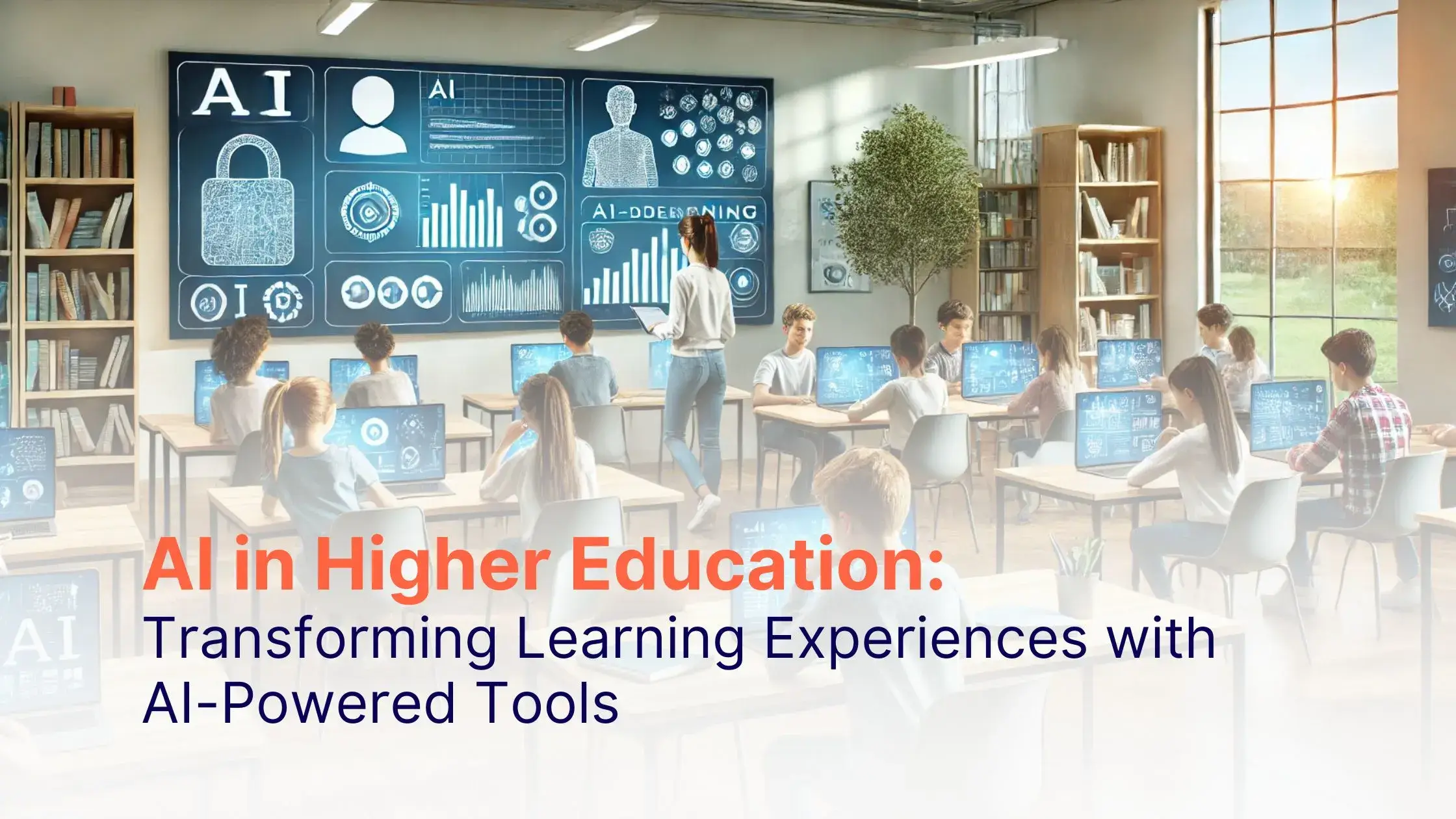AI in Higher Education
By, Kramah Author

Artificial Intelligence (AI) is revolutionizing higher education by making learning experiences more personalized and adaptive. With the growing integration of AI in higher education, students can now benefit from tools that adjust learning content and pace according to their individual strengths and weaknesses. This approach promotes engagement and better learning outcomes, yet presents some challenges in fully addressing the complexities of each student’s unique learning needs.
In this blog, we’ll explore the transformative impact of AI on higher education, the real-time challenges faced, and strategies to implement a balanced approach where AI complements human guidance.
AI in Higher Education: Personalized Learning for Student Success
AI-powered tools in higher education have become game-changers by personalizing learning experiences. By adapting to each student’s pace, these tools make complex concepts accessible, fostering a better grasp of the material. However, even as AI in higher education gains traction, there are some significant real-time pain points educators and institutions face.
Real-Time Challenges in Higher Education
One of the main challenges in implementing AI in higher education is that adaptive learning platforms may not fully capture each student’s individual learning style or engagement levels. While AI customizes content, it may miss nuances like student motivation or social learning needs. To learn more about how AI impacts motivation and student engagement, check out this overview of Artificial Intelligence in Education by EdSurge. Educators must ensure that AI-driven tools in higher education support rather than replace human guidance.
Solutions: A Balanced Approach to AI in Higher Education
Adopting a hybrid approach that combines AI-driven insights with human-led support can help overcome these challenges. Here’s how AI in higher education can be optimized with this strategy:
- Teacher-AI Collaboration in AI Higher Education
By empowering educators to interpret AI recommendations, they can fill in gaps with emotional and social learning support. Teachers provide insights that enhance the effectiveness of AI tools in higher education, ensuring a more balanced learning experience. This guide to AI and human collaboration in education provides best practices for integrating AI with teacher-led support. - Student Feedback Loops for Improved AI Higher Education Tools
Incorporating regular feedback from students helps AI tools better align with individual learning styles. These feedback loops enhance AI’s role in higher education, enabling it to meet diverse student needs more accurately. A practical example can be found in this case study on adaptive learning systems by EDUCAUSE, which demonstrates how feedback can improve AI performance in education. - Data-Rich Inputs for Comprehensive AI in Higher Education
AI systems designed to capture classroom interactions and learning preferences can deliver a more complete view of each student’s progress. By using data-rich contextual inputs, AI in higher education becomes more effective in personalizing education. For insights on balancing personalization and privacy, this article on AI ethics in education offers valuable information on the topic. - Blended Learning Models in AI in Higher Education
Combining independent, AI-driven learning with collaborative, instructor-led sessions supports diverse learning needs and fosters essential social skills. This blended model of AI in higher education balances technology and human interaction. Learn more about implementing this approach in higher ed with best practices for hybrid classrooms. - Continuous System Updates in AI in Higher Education Tools
Ongoing updates to AI algorithms ensure they keep up with educator feedback and student outcomes. Regular refinement makes AI in higher education more responsive to evolving educational needs. This resource on emerging AI trends in education provides further details on how AI advancements can continuously enhance learning experiences.
Conclusion: A Hybrid Path Forward in AI in Higher Education
AI’s role in higher education is undoubtedly transformative, but the key to maximizing its impact lies in a hybrid approach. By blending AI’s precision with human insight, AI in higher education creates an environment that supports diverse student needs and promotes a balanced, personalized learning experience.
Book a Free Demo Today!
“Maximize Student Success with AI Higher Education Solutions: Embrace a Hybrid Approach that Combines AI Precision with Human Insight for a Personalized Education Experience!”
FAQ's:
How is AI being used in higher education today?
AI in higher education is widely used to personalize learning experiences, analyze student data, and support adaptive learning platforms. It helps tailor course materials to each student’s needs, offering a customized learning path based on their strengths and weaknesses. AI is also used in grading, scheduling, and even virtual tutoring.
What are the benefits of AI-powered personalized learning?
AI-powered personalized learning allows students to learn at their own pace, which improves comprehension and engagement. By adapting content to individual needs, AI helps students focus on challenging areas, leading to better retention and academic success. This approach also saves instructors time, allowing them to focus on student interaction and guidance.
What challenges do schools face when using AI in higher education?
Implementing AI in education presents several challenges, such as ensuring data privacy, handling technical issues, and avoiding excessive reliance on AI over human interaction. Educators must also work to make AI tools accessible for all students and balance the technology with social and collaborative learning experiences.
Can AI fully replace human educators in the classroom?
No, AI cannot fully replace human educators. While AI can assist by personalizing learning and managing administrative tasks, the role of teachers remains essential for providing emotional support, fostering collaboration, and addressing students’ unique social needs. A hybrid model, combining AI precision with human insight, offers the best approach.
How can institutions start using AI effectively in their classrooms?
Institutions should start by identifying specific areas where AI can support learning, such as through adaptive learning platforms or AI-powered data analysis. Partnering with EdTech companies, training staff, and creating feedback mechanisms can also help integrate AI into classrooms smoothly and ensure it aligns with educational goals.
